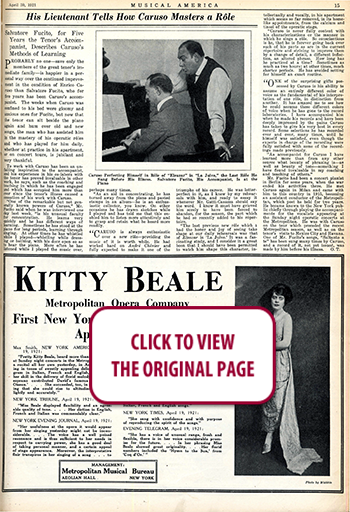 100 YEARS AGO IN MUSICAL AMERICA (385)
100 YEARS AGO IN MUSICAL AMERICA (385)
April 30, 1921
Page 15
His Lieutenant Tells How Caruso Masters a Rôle
Salvatore Fucito, for Five Years the Tenor’s Accompanist, Describes Caruso’s Methods of Learning
PROBABLY no one-save only the members of the great tenor’s immediate family is happier in a personal way over the continued improvement in the condition of Enrico Caruso than Salvatore Fucito, who for five years, has been Caruso’s accompanist. The weeks when Caruso was confined to his bed were gloomy and anxious ones for Fucito, but now that the tenor can sit beside the piano again and hum over old and new songs, the man who has assisted him in the mastery of his operatic rôles and who has played for him daily, whether at practice in his apartment, or on concert tours, is jubilant and very thankful.
To work with Caruso has been an unfailing inspiration to the accompanist, and his experience in his co-labors with the tenor has proved invaluable. In other work, he says, such as the coaching and teaching in which he has been engaged and which has occupied him more than ever since the tenor’s illness caused a cessation of his work with Caruso.
“One of the remarkable but not generally known powers of Caruso,” Mr. Fucito said when he was interviewed one day last week, “is his unusual faculty for concentration. He learns very quickly and he has different ways of learning. Sometimes he has stood at the piano for long periods, learning through singing. At other times he has whistled while I played—whistling while dressing or bathing, with his door open so as to hear the piano. More often he has listened while I played the music over, perhaps many times.
“As an aid in concentrating, he has turned away from the piano and pasted stamps in an album—he is an enthusiastic collector, you know. On other occasions he has drawn sketches while I played and has told me that this enabled him to listen more attentively and to grasp and retain what he heard more readily.
“CARUSO is always enthusiastic over a new rôle—providing the music of it is worth while. He _had worked hard on André Chenier and fully expected to make it one of the triumphs of his career. He was letter-perfect in it, as I knew by my rehearsals with him, and ready to essay it whenever Mr. Gatti-Casazza should say the word. I know it must have grieved him sorely to have been forced to abandon, for the season, the part which he had so recently added to his répertoire.
“The last previous new rôle which I had the honor and joy of seeing take shape at our daily rehearsals was that of Eleazar in ‘La Juive.’ It was a fascinating study, and I consider it a great boon that I should have been permitted to watch him shape this character, intellectually and vocally, in his apartment which seems so far removed, in its homelike appointments, from the calcium and tinsel of the operatic stage.
“Caruso is never fully content with his characterizations or the manner in which he sings a rôle. So conscientious is he, that he is forever going back over such of his parts as are in the current répertoire and striving to improve them by a change of detail, a different inflection, an altered phrase. How long has .he practiced at a time? Sometimes as much as two hours; at other times, much shorter periods. He has avoided setting for himself an exact routine.
“ONE of the surprising gifts possessed by Caruso is his ability to assume an entirely different color of voice as the fundamental of his interpretation of one rôle, in distinction from another. It has amazed me to see how he could assume these different colors of voice when he has gone to the record laboratories. I have accompanied him when he made his records and have been deeply impressed by the pains Caruso has taken to give his very best in every record. Some selections he has recorded over and over, many times, until he himself was satisfied, even though the experts in charge of the recording were fully satisfied with some of the recordings made previously.
“As accompanist for Caruso I have learned more than from any other source what beauty of phrasing is—as well as beauty of tone—something I have found invaluable in my coaching and teaching of others.”
Mr. Fucito had been a concert pianist in Berlin for some years, when the war ended his activities there. He met Caruso again in Milan and came with him to this country in 1915, becoming an assistant conductor of the Metropolitan, which post he held for two years. He became known to the New York public chiefly through playing the accompaniments for the vocalists appearing at the Sunday night operatic concerts at the Metropolitan. He was with Caruso on the tour which preceded the recent Metropolitan season, as well as on the tenor’s visits to Mexico City and Havana. One of Mr. Fucito’s songs, “Sultanto a te” has been sung many times by Caruso, and a record of it, not yet issued, was made by him before his illness. —O. T.




 RENT A PHOTO
RENT A PHOTO





